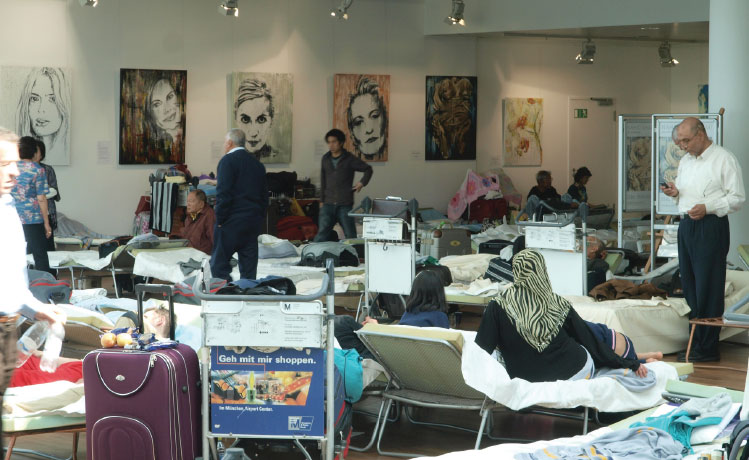
Airports ensured the safety and comfort of many passengers, with some providing beds, blankets, bottles of water and medical support, and others also provided free internet access (a novelty in 2010 which has since become a staple!) and even entertainment.
By Robert O’Meara
The week of 14 to 21 April 2010 stands out in the memories of many people – within ACI EUROPE, within aviation and beyond, among the millions of air travellers that were affected. The people of Iceland remember it vividly too, for it was the week when one of their volcanoes – the tongue-twistingly titled Eyjafjallajökull – introduced a new threat to European airspace: volcanic ash.
At first, it was just a minor story about volcanic activity in Iceland, but over the course of 26 hours, European mobility broke down, air space by air space, as an untested methodology for analysing the threat of volcanic ash was replicated by civil aviation authorities across the continent.
At its worst moment, the threat of volcanic ash paralysed 313 airports – about 80% of the European airport network. Most of Europe’s airlines didn’t have a single aircraft in the sky at that point, for the first time in over 65 years. More than 10 million passengers affected all had one thing in common – they couldn’t get to where they needed to go.
Representatives of ACI EUROPE spent most of that weekend in EUROCONTROL, in high-level discussions with the European Commission’s Transport Directorate (DG MOVE), EUROCONTROL, the Spanish Presidency of the EU, the Association of European Airlines (AEA) and a few others.
EUROCONTROL has several roles, but in the context of the volcanic ash cloud, its role in flow management was particularly important. By Friday 16 April, EUROCONTROL’s Network Operations Portal, which provides operational updates to technical stakeholders, was receiving over 200 ‘hits’ every second. The innovative use of Twitter by airports, airlines and most notably EUROCONTROL itself, marked a watershed moment for the social network in Europe. For its part, ACI EUROPE kept its members updated during the entire episode and tracked how airports were responding to the crisis, as much as possible – keeping the media informed and asserting that the situation was beyond being simply an airline crisis story.
When the ash cloud was at its peak, in addition to managing the flows that were still taking place elsewhere in Europe, EUROCONTROL was working together with colleagues throughout the industry to bring together the experts – in fields such as volcanology, meteorology, jet engines and aviation, to share the results of modelling, ground-based observations and test flights and to come up with a way of improving how we were collectively managing the crisis. Based on all this information, EUROCONTROL, in close cooperation with the European Commission, hosted a series of meetings and one particularly decisive teleconference on 19 April with experts, Member States, air navigation service providers and industry representatives (including ACI EUROPE, naturally). A proposal for a revised approach as to how to assess the dispersion of volcanic ash into the atmosphere was agreed and then presented to EU Transport Ministers, who adopted it. This revised approach allowed the affected areas to be considerably downsized. Within hours, it was being implemented and aircraft were able to fly safely in many previously restricted areas.
In terms of traffic, European airports lost around 18 million passengers during the six-day period and sporadic air closures in the weeks after, resulting in over €290 million in lost revenues and additional extra assistance provided to stranded passengers.
These airports ensured the safety and comfort of many passengers, with some providing beds, blankets, bottles of water and medical support, and others also provided free internet access (a novelty in 2010 which has since become a staple!) and even entertainment. Scenes of stranded passengers in airports were all over the front pages of newspapers that week and ACI EUROPE was heavily quoted in the international press, speaking on behalf of the industry.
In the immediate aftermath of the volcanic ash crisis, ACI EUROPE called for a European Aviation Relief Plan from the European Commission and submitted a joint paper with the AEA, detailing the extraordinary blow that the incident dealt to the air transport industry.
A few days later, on 27 April, European Commission Vice-President for Transport Siim Kallas gave a press conference on the impact of the volcanic ash crisis, during which he said “Sometimes we don’t really appreciate the value of something, until we don’t have it anymore – that is what happened with aviation last week.”
The European Commission also expressly recognised the action taken by Europe’s airports in its official remarks about the impact of the ash crisis, stating ‘The fact that, in the view of the magnitude of the situation, some air carriers were momentarily unable to provide the assistance under regulation 261/2004 brought the airports to spontaneously help the first needs of stranded passengers during their stay at the airport, with additional costs for airports.’







